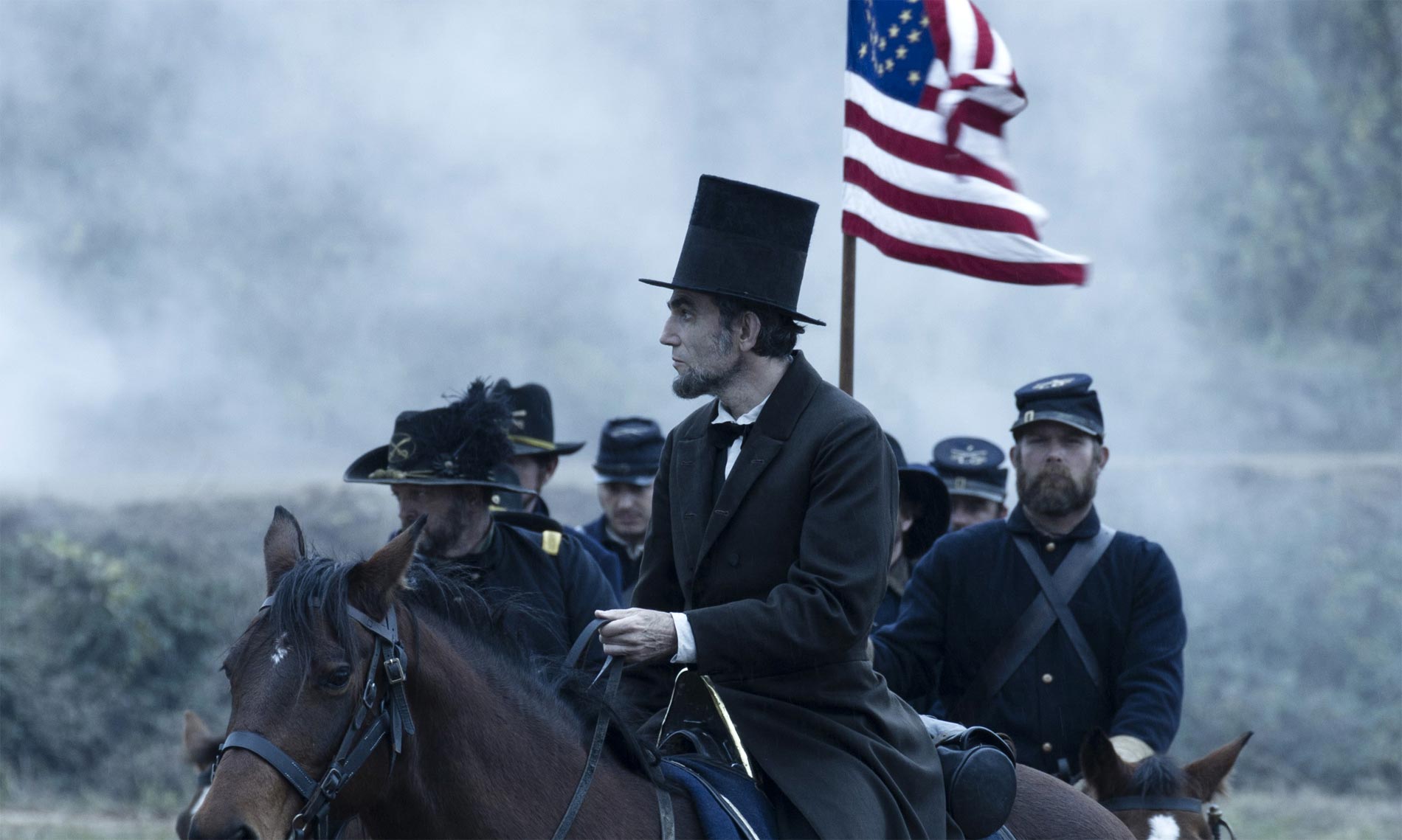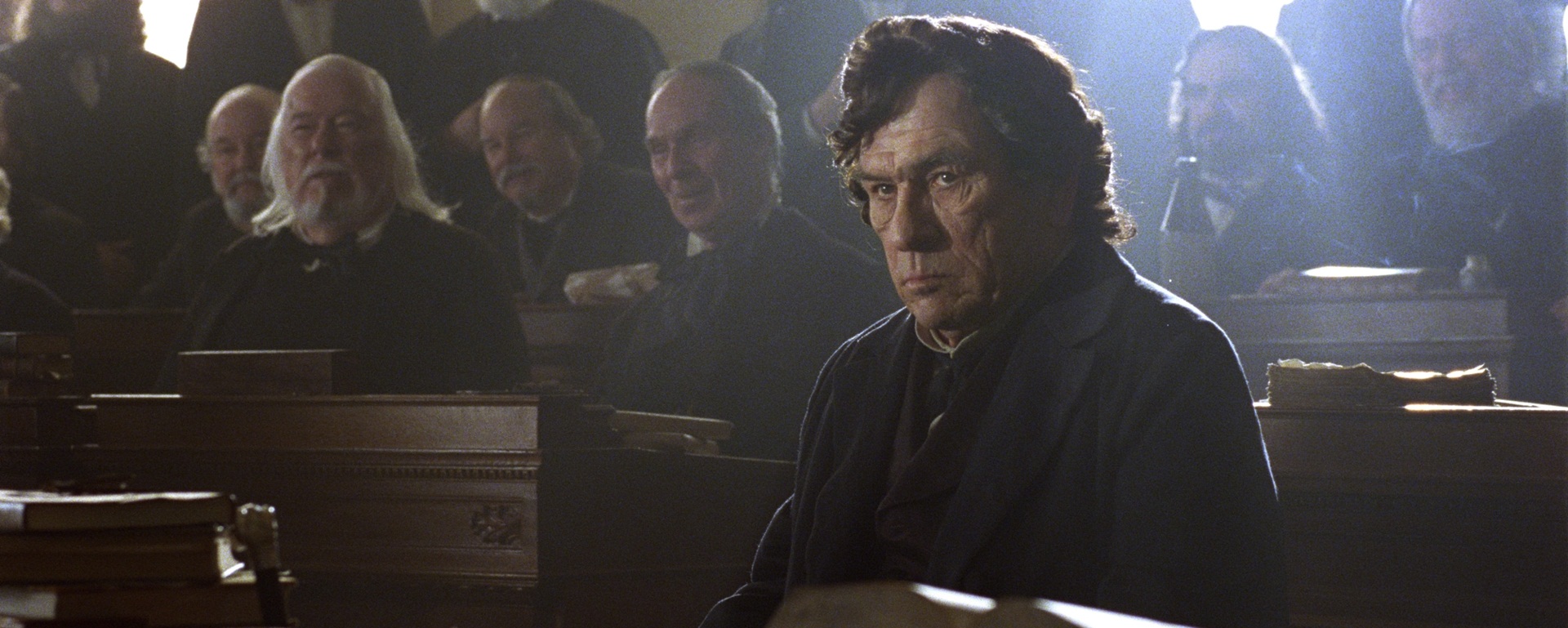I saw Steven Spielberg and Daniel Day-Lewis' new masterpiece last night. It was a quite compelling and brilliantly acted film. I really enjoyed myself. But it was also like sitting though a 2 hour history lesson. This is a tremendously dense movie that feels more like a documentary of the political process in the mid-1800s than it does a piece of entertainment. It is an important movie, one that everyone probably should see, but very few people will see because it just isn't mainstream entertainment.
The characters frequently talk in authentic 1800s English, which is sometimes hard to understand. The movie tries to explain some of the backstory and what the political situation was at the time, but it is a very complicated thing. My wife, who is Ivy-league educated and knows more than most Americans about history, was utterly lost at times. Much of the movie is a political fight in the House of Reps between Democrats, Abolitionist Republicans, and more moderate Republicans. She kept on getting confused about who was who, who wanted what, and why different characters were doing different things. I fear that many people will get confused and lose track of the story.
The film is an acting triumph. Daniel Day-Lewis is a shoe-in to get a best actor nomination, no surprise there. He becomes Lincoln. It is scary how close he is to our image of the great president. Tommy Lee Jones is likely to get a Best Supporting Actor nomination for his portrayal of equal rights activist Thaddeus Stevens. He has amazing power and most of the movie's best moments center around him. I thought Sally Field, as the partially insane First Lady Mary Todd Lincoln, was a bit too overwrought and I found the scenes with her tiresome. Then again, I think we are supposed to sympathize with Lincoln's struggles with his wife and family while simultaneously dealing with the most difficult time our nation has ever seen. Similarly, Joseph Gordon Levitt feels a bit extraneous to the film's central story playing Lincoln's oldest son Robert, who desperately wants to leave Harvard so he can join the Union army.
Those are the biggest names, but this movie is dripping with amazing actors. James Spader and Tim Blake Nelson have a pair of fun roles as men employed by the Administration to convince members of congress to change their mind about ratifying the 13th Amendment. David Strathairn does a very nice job as Secretary of State William Seward. Jack Earl Haley ("hey, that's the guy from The Bad News Bears," my wife said) has a small but impressive turn as the Vice-President of the Confederacy. Jared Harris plays Gen Grant without his usual British accent. There are name actors, well-known stars, who just drift in for one scene and a few lines and then disappear again. Dane Dehaan, who was the star of this spring's sci-fi hit Chronicle, shows up at the beginning of the movie for about 30 seconds to recite part of the Gettysburg Address. Gloria Rubin plays Mary Lincoln's maid and mostly just goes from scene to scene with a worried look on her face. I could go on and on. I am telling you, this is the most off-the-charts impressive cast you may ever see on film. It is certain to get a SAG nomination for best ensemble.
The story is the tale of Lincoln desperately trying to get the 13th amendment, the one that abolished slavery, passed through the belligerent House of Representatives. Most of us (heck, I am guilty of being woefully ignorant about this part of our history) probably thought that the Emancipation Proclamation freed the slaves, but the movie quickly explains why that action was built on very fragile legal ground and why Lincoln felt he needed the amendment. One of the tricks Lincoln needs to navigate is the fact that while most Americans in the Union thought slavery was a horrible thing, they were not prepared to think of blacks as equals... not even close. The idea of blacks having the vote was abhorrent (funny line where someone in congress screams, "next you'll be telling me that women should be allowed to vote!" which brings everyone in congress to their feet in loud shouts of protest). Giving them anything close to equal legal rights is terrifying to most whites. It all evolves into a fascinating morality play and political thriller... almost a race against time between Lincoln trying to get the amendment through and other forces trying to strike a peace with the South that would kill the amendment.
That said, it is just not going to be a mainstream hit. History buffs and anyone who appreciates fine acting will go gaga over it. But it will probably have trouble finding a wider audience. I'll be shocked if it can generate more than maybe $60 or 70 mill of boxoffice. The only way they can make it do more than that is probably to lie in the marketing and pretend it is a movie filled with exciting war scenes. In truth, there is one battle in the film, in the beginning, and it lasts for less than 3 minutes.
It is worth noting that the film almost feels like a propaganda film for Republicans. They are the overwhelming good guys here and the Democrats are not likeable at all (except for the ones who agree to switch their votes to help the amendment pass). Had this come out before the election, I actually think it could have raised a bit of a controversy. Any concerns that the extremely liberal Spielberg would color the film with his own personal political views are unfounded in my mind.
Finally, an amusing side note -- imagine being an unknown actor and finding out you have won the role of Robert E. Lee in a movie about the end of the Civil War, a film directed by Steven Spielberg! You'd be over the moon excited! This is your big break! Well, the guy who plays Lee does not have a single line. It was kinda funny. Heck, I am not even sure everyone in the audience knew he was supposed to be Robert E Lee, he is just so guy with white hair riding away from a meeting at the Appomattox Courthouse.
--Jason "I strongly urge folks to see this movie... but I did the same for Cloud Atlas and America didn't listen to me then either" Evans
Results 1 to 20 of 28
Thread: Lincoln review
Threaded View
-
11-08-2012, 03:30 PM #1
Lincoln review
Why are you wasting time here when you could be wasting it by listening to the latest episode of the DBR Podcast?
Similar Threads
-
Haywire review
By JasonEvans in forum Off TopicReplies: 15Last Post: 02-04-2012, 11:26 PM -
Up In The Air review
By JasonEvans in forum Off TopicReplies: 8Last Post: 01-02-2010, 01:54 AM -
UP review
By Bluedog in forum Off TopicReplies: 31Last Post: 06-12-2009, 03:02 PM -
Lincoln's 200th Birthday
By brianl in forum Off TopicReplies: 2Last Post: 02-13-2009, 08:51 AM









 Reply With Quote
Reply With Quote